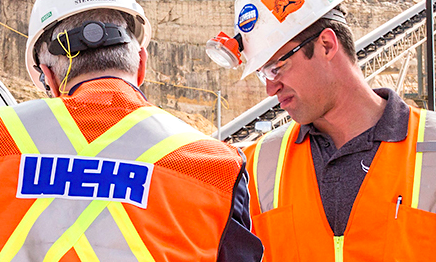Glasgow-based engineering giant Weir Group said on Thursday it has withdrawn its recommendation to pay a 2019 final dividend and has withdrawn its 2020 guidance issued on February 26.
“Given the level of uncertainty in our main markets due to Covid-19, our 2020 guidance issued on 26 February is now withdrawn and we will update further when visibility improves … ” said Weir, one of Scotland’s largest companies.
” … the board believes that it is prudent at this stage to provide maximum flexibility and has therefore taken the decision to withdraw its recommendation to pay a 2019 final dividend.”
In a stock exchange statement, Weir said: “In China where our three facilities endured a forced shut-down in early February we are now back to full operating capacity.
“However, in recent days we have seen increasing interruption at some of our other operations and supply chains as governments step up their efforts to control the spread of Covid-19.
“The main impact on our facilities so far has been in the US, UK, South Africa, Peru and Malaysia.
“We anticipate further disruptions as we move forward, although the extent and duration remains unknown.
“From a customer perspective, with the exception of South Africa, we have seen most mining operations continue, albeit subject to some restrictions.”
On trading, Weir said: “Trading in January and February was in line with our expectations across each of our divisions.
“Through March, with the significant reduction in oil prices and escalation of the global Covid-19 pandemic, the external environment has changed rapidly.
“In minerals and ESCO, overall aftermarket demand in our main mining markets has remained robust so far, reflecting miners’ focus on continuing production and the mission-critical nature of our products.
“March to date has seen a slowdown in original equipment orders, although the longer-term project pipeline remains active.
“Oil & Gas has seen North American order activity start to slow as a result of lower oil prices and widespread reductions in E&P capex.
“We expect to see continued sequential declines in activity through 2020 with E&P capex now expected to be down at least 30% year on year versus our prior expectation of 10%.
“Given the level of uncertainty in our main markets due to Covid-19, our 2020 guidance issued on 26 February is now withdrawn and we will update further when visibility improves.”
On “mitigating actions” Weir said: “In Oil & Gas we have taken immediate action in response to the expected incremental activity declines with an additional $30m annualised cost reduction plan, which includes a further 25% reduction in the division’s North American workforce and periodic furloughs, while across the Group we have implemented cost reduction measures including a recruitment freeze and restrictions on all discretionary spending.
“In addition, we are curtailing all non-essential capital expenditure so that spending in 2020 will now be significantly lower than our previous guidance, and working capital will be managed so as to minimise the normal seasonal outflow in the first half of the year.
“More broadly, given the highly uncertain environment, we are planning for a number of potential downside scenarios of varying severity which consider: widespread disruption to our operations and supply chain; deferment of original equipment orders; and, reduced aftermarket demand.
“Each scenario considers a range of further mitigating actions to reduce costs and conserve cash at both the operational and corporate level.
“Finally, the board believes that it is prudent at this stage to provide maximum flexibility and has therefore taken the decision to withdraw its recommendation to pay a 2019 final dividend.”
On its balance sheet and liquidity, Weir said: “The group currently has immediately available liquidity of c.£500m through committed facilities and cash balances.
“The group’s leverage at 31 December 2019 was 2.4 times net debt to EBITDA, against a financial covenant of 3.5 times.
“As in prior downturns, we expect the business to continue to be highly cash generative and to benefit from working capital inflows if volumes decline.”
